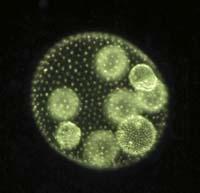The algae collaborate before the previewed

Analyzing the genetic differences between groups of Volvox and other species of algae in fossil algae, researchers at the University of Arizona have concluded that the algae of the group of Volvox algae began to collaborate much earlier than previously thought.
The unicellular algae that are grouped in these groups of algae act as if they were a live multicellular: some are responsible for proliferation, others join to form flagellae, etc., but in reality each cell is an independent individual.
Scientists have long been trying to figure out when these algae began to collaborate, analyzing gene differences between them. In fact, the differences that a gene has from one species to another can be used to determine when they differentiated from each other.
The research carried out in the 1970s suggested that about 50-75 million years ago met for the first time. But in the research, a single gene was compared in a single group of fossils. Now, the Arizona team has conducted a more thorough study, analysed some genes in 30 species and calculated that 200 million years ago they founded the alliance we know today.
Buletina
Bidali zure helbide elektronikoa eta jaso asteroko buletina zure sarrera-ontzian











